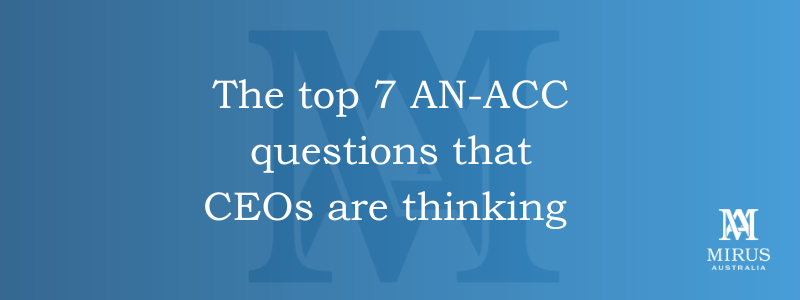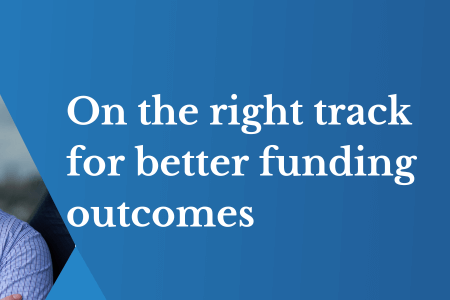The aged care funding model questions on the minds of CEOs
August 1, 2022 | Aged Care Finance

By Shannon Sanderson, National Business Development Manager
I was talking to the CEO of a Melbourne based Provider last year about the incoming aged care funding model, AN-ACC. His organisation was facing COVID-19 outbreaks at multiple sites, and he was also mindful of the impact aged care funding model changes would bring. He said something to me that really stuck.
“The calendar doesn’t stop for a pandemic”.
The new aged care funding model will be a reality in less than three months, and with a new wave of COVID-19 hitting the industry yet again, it is a timely reminder – the calendar doesn’t stop for a pandemic.
From our conversations with providers, here are seven questions on the minds of CEOs to ask yourself and your team about your readiness for AN-ACC on October 1st .
1. Is my Board on board?
Standard 8 in the Aged Care Quality Standards discusses
“Managing high-impact or high-prevalence risks associated with the care of consumers.”
I’m pretty sure that a change in the way a Provider receives 70% of their income fits in here.
In the many Board education sessions we have run there is a consistent outcome where greater Board engagement leads to easier conversations about strategy and expenditure on AN-ACC preparedness.
2. Are we confident the shadow assessments accurately reflect our residents’ care needs?
AN-ACC is different from previous funding models in aged care with the assessments of the residents being completed by a third party. We are moving to the scenario where the Provider becomes the validator. It is critical that you are confident each of the shadow assessments are correct because they not only dictate the level of funding you receive, but also the care minutes you will need to provide.
There is no limitation on the number of reclassifications you can request in the lead up to October 1 2022.
3. Can my team predict the AN-ACC classification of a prospective resident?
New resident admissions will impact your funding but also your roster. Being able to predict the classification and residential aged care funding of a resident will also allow you to understand the impact each new resident will have on your roster. There is an immediate return on the investment for educating your staff on the clinical frameworks used in AN-ACC.
4. How will my data be affected?
In the ACFI world, where we complete our own assessments, we have access to a good data pool. With the change of funding models in aged care comes the reduction in the data we will have available to us. ‘John Doe – Classification 10’ is likely all the information Providers will be receiving.
By contrast the DoH and Quality and Safety Commission will have access to your resident’s data. We have heard the frustration from Providers on this topic and are incorporating the ability to store your data and benchmark against other Providers in the redevelopment of Mirus Metrics.
5. Are we bringing the team along on the journey?
At the conclusion of a recent workshop ran for a WA client, we asked participants how they felt at the end of the workshop in comparison to the start of the workshop. One of the Care Managers admitted before the session that she was very nervous about AN-ACC, the processes involved and how it would impact her role. However, at the end she felt positive and open to the opportunities AN-ACC will bring. The three hours we spent educating their team and workshopping their path to AN-ACC readiness meant their executive, clinical, finance, funding and quality teams all heard the same information and were part of developing their future vision.
6. Do we have the right skill set?
The role of an AN-ACC Coordinator is substantially different to that of an ACFI Coordinator. The AN-ACC model will require Providers to analyse data and make informed decisions on which resident to admit, when to ask for a reclassification (up or down) and how this will impact care minutes and the roster. It is a business analytic skillset that many Providers are telling us they do not have inhouse at a facility level.
So, the question becomes how do they access this skillset?
- Do they have people in place that could perform this role or could be upskilled accordingly?
- Do they hire for this position knowing how competitive the employment market is?
- Do they contract in as some do for Allied Health, hospitality, and legal expertise.
We are supporting clients looking for all options
- Inhouse development which can include the Transitioning Your Business Module in our AN-ACC Advanced Course,
- Advice on what a position description for this role might include
- How Mirus could provide this role for you.
7. Do I need to look at care minutes requirements yet?
One of the important areas that can be overlooked in the preparation for AN-ACC is how Providers are addressing care minute requirements which don’t become mandatory until October 2023. However, care minutes make up 22% of a Provider’s Star Ratings which are due to launch by the end of 2022 with the data being drawn from your Quarterly Financial Report.
We are working with Providers to help them document what they are including or excluding from care minutes. This document should be used by HR, finance and clinical teams and will provide guidance on how you are to meeting your care minute requirements.
We understand the pressures aged care providers are under right now. We have been hard at work building a suite of new education, services and expanding our technology solutions with new functionality that will ease the burden of adapting to the AN-ACC world.
Our goal is to educate your whole team (Board included), minimise the disruption caused by AN-ACC’s introduction, and get you back to doing what you do best – caring for your residents.
Would you like to talk more about AN-ACC and your business?


